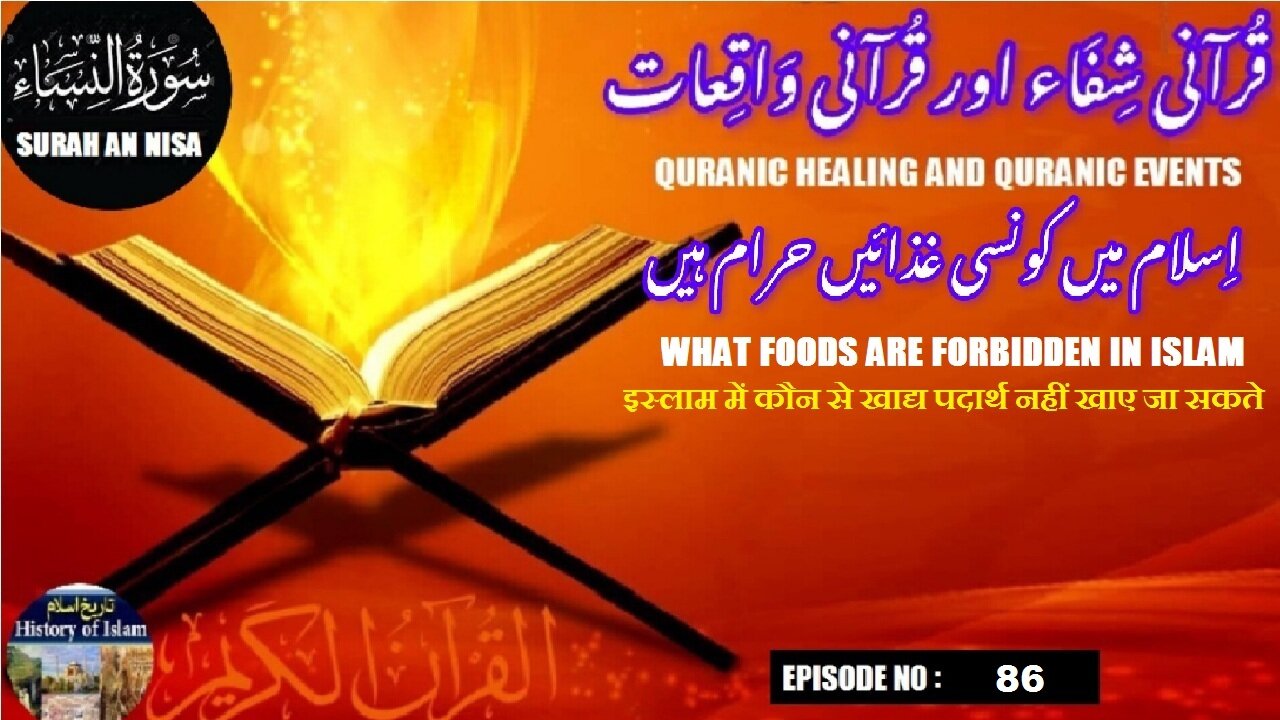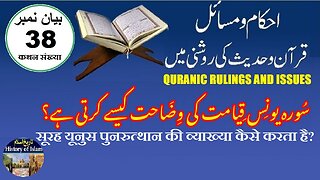Premium Only Content

What foods are forbidden in Islam اسلام میں کون سی غذائیں حرام ہیں؟
@islamichistory813 #healing #and #events #from #the #quran #historical #stories #and #events #quranicstories #selfhealing #success #stories #striking #events #in #history #quranstories, #storiesfromthequran #religious #creation #stories #trending #quran #short #historical #loves #historical #heroes #what #is #true #strength #calm #quran #recitation #for #babies #islamic #healing
What Foods Are Forbidden in Islam? Understanding Quran verses 1–4 of Surah Al-Ma’idah on Halal and Haram
Brothers, sisters, friends and elders Assalamu Alaikum, wa Rahmatullahi wa Barakatuhu, we are presenting the 86th episode of the Islamic informative video based on healing and events from the Holy Quran, and in this video we will describe, What Foods Are Forbidden in Islam? Understanding Quran verses 1–4 of Surah Al-Ma’idah on Halal and Haram
Verses 1–4 of Surah Al-Ma’idah provide important guidance regarding what is lawful (halal) and unlawful (haram) for Muslims, especially concerning food consumption and sources of income. These verses outline a clear framework designed to protect the physical and spiritual well-being of believers by prohibiting certain foods and unlawful means of gaining wealth. The prohibitions on consuming carrion, blood, pork, and animals slaughtered without invoking Allah’s name serve as foundational dietary laws in Islam, ensuring purity, cleanliness, and obedience to divine commands. Additionally, the verses warn against gambling and obtaining unlawful gains, highlighting the ethical dimensions of earning a livelihood and promoting fairness, honesty, and social justice.
The Quran explicitly forbids the consumption of carrion, or dead animals not properly slaughtered, as well as blood, pork, and any animal sacrificed in the name of anyone other than Allah. Carrion is considered impure and harmful, as it can carry diseases and toxins that pose physical dangers. From a spiritual perspective, eating such food signifies disobedience to Allah’s commands, which undermines a Muslim’s relationship with the Creator. Blood is also forbidden, partly because it is the life-force of the animal, and consuming it is seen as disrespectful to the sanctity of life. Pork is prohibited in Islam due to both health reasons and symbolic purity laws established in the Quran and the broader Islamic tradition. These dietary restrictions are not arbitrary but come with wisdom, emphasizing cleanliness, respect for life, and submission to divine guidance.
Furthermore, the prohibition extends to animals that are slaughtered without invoking Allah’s name. In Islam, the act of slaughtering an animal is not merely physical but a spiritual act that involves remembering and thanking Allah for the provision. Consuming meat from animals slaughtered in the name of other gods or without the proper Islamic method is thus considered unlawful. This rule reinforces the idea that lawful sustenance must be obtained in a manner that acknowledges God’s sovereignty and blessing.
The verses go beyond food laws to address broader ethical issues, specifically prohibiting gambling (referred to as “maysir”) and unlawful earnings. Gambling is condemned because it promotes greed, exploitation, and a harmful fixation on chance rather than honest work and effort. It disrupts social cohesion by fostering addiction, financial ruin, and unjust gain at the expense of others. Islam encourages earning through honest, productive means, and gambling contradicts this principle by encouraging luck-based wealth accumulation without effort or fairness.
Unlawful earnings encompass a wide range of dishonest behaviors, including theft, fraud, bribery, usury (riba), and any form of exploitation. These are condemned because they violate the rights of others, create social injustice, and corrupt the economic system. The Quran calls on believers to seek sustenance through lawful and ethical means, ensuring that their wealth is pure and their dealings just. Such principles safeguard society from economic oppression and build a foundation of trust and cooperation.
Interestingly, these verses also provide an allowance for consuming food that is caught by wild animals or fish, indicating that natural, unprocessed sources of food are permissible, provided they do not violate other dietary restrictions. This exception acknowledges the realities of human survival and promotes moderation and flexibility within the dietary laws.
The guidance in these verses reflects Islam’s holistic approach to life, where physical health, spiritual purity, and ethical conduct are interconnected. By prescribing what is lawful and unlawful, the Quran helps believers cultivate self-discipline, mindfulness, and gratitude. Observing these laws fosters a sense of community identity and shared values, reinforcing the Muslim commitment to obedience and righteousness.
Moreover, the prohibitions against gambling and unlawful earnings highlight Islam’s concern for social justice and economic fairness. Wealth and sustenance are seen as blessings from Allah that must be earned and spent responsibly. These verses encourage a just economic system where exploitation is minimized, and all members of society have fair opportunities to thrive. This emphasis on lawful earning and spending is part of a broader Islamic ethics that seeks to prevent corruption, reduce inequality, and promote solidarity.
In summary, verses 1–4 of Surah Al-Ma’idah articulate fundamental principles about dietary laws and economic ethics in Islam. The prohibitions on certain foods such as carrion, blood, pork, and improperly slaughtered animals ensure physical health and spiritual obedience. The condemnation of gambling and unlawful earnings promotes social justice, fairness, and responsible economic behavior. Together, these rules guide Muslims to live lives marked by discipline, purity, and integrity, cultivating personal piety and communal harmony. They serve as a reminder that what believers consume and how they earn their livelihood are acts deeply tied to their faith and relationship with Allah.
With this, we ask for your permission until tomorrow and pray to Allah Almighty to grant us the ability to act on the Quran and Hadith, Amen
Allah Hafiz
============================
-
 10:13
10:13
ISLAMIC HISTORY
13 hours agoHow does Surah Yunus explain resurrection سورہ یونس قیامت کی وضاحت کیسے کرتی ہے؟
3 -
 1:17:42
1:17:42
Glenn Greenwald
4 hours agoUS/Venezuela Escalations: Revisiting Key Developments and the Push for Regime Change | SYSTEM UPDATE SPECIAL
90.7K112 -
 LIVE
LIVE
ProvenTactics
1 hour agoFPS Shooter Games
51 watching -
 LIVE
LIVE
Phyxicx
1 hour agoHarvester - The Funniest, Most Deranged 90s Game Ever | 18+ | 10/9/2025
62 watching -
 LIVE
LIVE
LFA TV
22 hours agoLIVE & BREAKING NEWS! | THURSDAY 10/9/25
633 watching -
 LIVE
LIVE
megimu32
1 hour agoON THE SUBJECT: Sequels That Slapped! 🎬
75 watching -

tminnzy
2 hours agoThe Final Runn || !stakeus || !stake
922 -
 LIVE
LIVE
Wahzdee
5 hours agoBF6 Countdown Stream – What to Play Till Launch? Let’s Talk Battlefield
17 watching -
 LIVE
LIVE
StevieTLIVE
2 hours agoNew WZ Season Zombies Mode is BACK
6 watching -
 LIVE
LIVE
Total Horse Channel
12 hours ago2025 CMSA World/AQHA World of Mounted Shooting - Thursday
56 watching